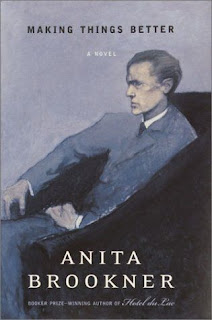What's your favourite Brookner line? Something positively freighted with many things Brooknerian. Something perhaps only Anita Brookner could have written.
Look at Me
A novel replete with quotability. I'm going to choose one of the most extreme, almost self-parodic lines, from the truly chilling chapter 11: Frances's desolate trek through a hostile nighttime London:
This must be the most terrible hour, the hour when people die in hospitals.
(Larkinian too. Think 'Ambulances' or 'The Building' - each room farther from the last and harder to return from.)
Falling Slowly
Miriam is imagining the thoughts of her contemporaries, those with lives more conventional than her own. You are not one of us, she imagines them thinking. You do not shop for cornflakes, fish fingers, baked beans. You will not grow fat. You do not take family holidays, the car loaded with junk. You only look astonishingly young, but you must be getting on.
Too late for you, then. You will just have to make do with the rest of your life, with only yourself for company. (Ch. 9)
Latecomers
Fibich, years later, safe in middle age, remembers getting on the Kindertransport, leaving his mother behind in Berlin. They would never meet again. Now in England, in the 1980s, in a London restaurant, he breaks down.
'I should have gone back,' whispered Fibich. 'I should not have left. I should have got off the train.' (Ch. 14)
A Misalliance
Now for something a little (but only a little) lighter:
Since living alone she had experienced varying degrees of exclusion, and, out of sheer dandyism, had made an ironical survey of the subject. (Ch. 3)
Out of sheer dandyism. All those hate-filled unthinking critics all those years: how could they have got Anita Brookner so wrong? How could they have overlooked her impeccable but subversive dandyism?
'At the Hairdresser's'
I am not lonely except in company. (Ch. 3)
What can one say to this? Echoing Larkin again, I think: 'nothing to be said'. Other than 'Brooknerianism in a nutshell', perhaps?
Visitors
For my next, a touch of aphoristic robustness.
Mrs May knew what families were for: they were for offering endless possibilities for coercion. (Ch. 2)
A Private View
Katy Gibb has gone, leaving George Bland disconsolate. Katy was an impossible proposition; their lives were incompatible. But he had been in love.
He made tea and drank it gratefully, yet in the act of eating a biscuit his face contracted once more with grief. (Ch. 11)
George Bland and that biscuit.
Family and Friends
Mimi, wounded for ever by events in her past, mourns her life - though it is not Frank for whom she yearns but the missing element in herself that would have brought him to her side.
It is as much as she can do now to avoid pain, simply to avoid pain. (Ch. 10)
The formal construction. And that repetition. Compare
Providence in the climactic scene:
I lacked the information, thought Kitty, trying to control her trembling hands. Quite simply, I lacked the information.
This could go on and on. Let me end for now with something evocative from
Altered States (ch. 13) and something hopeful (yes, that) from
Fraud (ch. 8) - both, I note, deploying exclamation marks. As I may have said before, always look out for Anita Brookner's exclamation marks.
The melancholy of London flats at nightfall!
Then the marvellous thought struck her: but there is no need to live like this!
 |
| London flats, nightfall, melancholy |



























